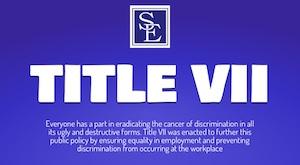OF DISCRIMINATION AND HARASSMENT
Title VII
Are you being subjected to discrimination because of your sex, race, color, national origin or religion while at work? Were you terminated from your employment because you complained about discrimination? Are you currently working in a hostile work environment that has made your working conditions so intolerable that you have no choice but to quit? If yes, the federal Title VII law may provide you with job protections or a legal claim of unlawful termination.
The purpose of Title VII of the Civil Rights Act of 1964 was to ensure equality in employment and to prevent discrimination at the workplace. Title VII makes it unlawful for an employer to discriminate against employees in connection with his or her compensation, terms, conditions, or privileges of employment on the basis of sex, race, color, national origin, and religion. It also prohibits an employer from retaliating against an employee who opposes discrimination. Title VII applies to employers who have fifteen (15) or more employees and to federal, state, and local governments.
How are you protected Title VII?
Title VII provides protections to prospective employees from discrimination. For example, an employer cannot make a hiring decision based on the job applicant’s color, race, religion, sex or national origin. An employer is also prohibited from discriminating when advertising, recruiting or testing potential employees for a job.
Title VII also provides many different job protections to employees. Based on an employee’s protected characteristics, the employer cannot:
- decide whether or not to promote or fire an employee,
- use this information when classifying or assigning employees,
- use this information to determine an employee’s pay, fringe benefits, retirement plan, or disability leave,
- harass the employee.
An unlawful employment practice under Title VII occurs when an employer does any of the following:
- adopts a discriminatory compensation decision or other practice;
- subjects an employee to a discriminatory compensation decision or other practice;
- affects an employee by application of a discriminatory compensation decision or other practice.
Title VII also has an anti-retaliation provision that provides job protection to employees who oppose discrimination at the workplace. Under the anti-retaliation provision, an employer cannot take an adverse employment action against an employee because he or she opposed a practice or act of discrimination in which he or she reasonably believed was unlawful. This means an employer may not demote or fire an employee because the employee complained about discrimination.
In order to prove a claim of unlawful termination under Title VII, the employee must first establish a prima facie case of discrimination. This generally means that the employee shows evidence that he or she is in a protected class, was qualified for the position and was terminated, and that the termination occurred in circumstances giving rise to an inference of discrimination. If the employee can establish a prima facie case, the burden then shifts to the employer to show that they took the action for legitimate non-discriminatory reasons. If the employer shows a legitimate, non-discriminatory reason for the termination, the employee must then show that the stated reason for termination is a pretext for discrimination. In other words, proving the stated reason for termination as being untrue.
The burden of proof is different in the rare cases where there is direct evidence of discrimination. Direct evidence of discrimination is when there is proof that the employer discriminated against an employee in taking the adverse employment action. When an employee can present direct evidence that discrimination was a substantial factor in the decision to terminate, the burden of persuasion on the issue of causation shifts, and the employer must prove that it would have terminated the employee even it had not considered the direct evidence of discrimination. The employer would have to convince the jury that it was more likely than not, the decision would have been the same absent consideration of the discriminatory factor. In other words, the employer would have to demonstrate that its sufficient business reasons would have induced it to take the same employment action with the discriminatory factor being removed from the calculus.
While it is the stated goal of Congress to stop discrimination through laws such as Title VII, discrimination remains all too commonplace in the work environment. If you believe you are the victim of workplace discrimination and would like to speak to one of our New Jersey Discrimination lawyers, please give us a call at our Holmdel, Monmouth County, New Jersey office.






